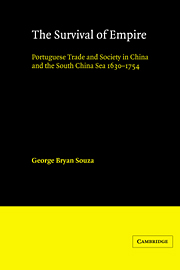Book contents
- Frontmatter
- Contents
- List of figures, maps and tables
- Glossary
- Notes on spelling and currency, weights and measures
- Preface
- 1 Maritime trade in Asia
- 2 Imperial foundations: the Estado da India and Macao
- 3 Population, personalities, and communal power
- 4 Country traders and Crown monopoly
- 5 Merchants and markets
- 6 Country traders and the search for markets
- 7 Imperial relations: Macao and the Estado da India
- 8 Imperial survival: Sino-Portuguese relations from Ming to Ch'ing
- 9 Macao, Companies and country traders: the other Europeans in China
- 10 Conclusion
- List of abbreviations and notes
- Primary Sources
- Bibliography
- Index
8 - Imperial survival: Sino-Portuguese relations from Ming to Ch'ing
Published online by Cambridge University Press: 24 October 2009
- Frontmatter
- Contents
- List of figures, maps and tables
- Glossary
- Notes on spelling and currency, weights and measures
- Preface
- 1 Maritime trade in Asia
- 2 Imperial foundations: the Estado da India and Macao
- 3 Population, personalities, and communal power
- 4 Country traders and Crown monopoly
- 5 Merchants and markets
- 6 Country traders and the search for markets
- 7 Imperial relations: Macao and the Estado da India
- 8 Imperial survival: Sino-Portuguese relations from Ming to Ch'ing
- 9 Macao, Companies and country traders: the other Europeans in China
- 10 Conclusion
- List of abbreviations and notes
- Primary Sources
- Bibliography
- Index
Summary
The survival of Portuguese society in China was seriously in question during the decline of the Ming and the establishment of the Ch'ing dynasty. Although the municipality was administered by the Portuguese, by the mid eighteenth century, Macao was incorporated through the implementation of a number of economic and administrative procedures into Ch'ing China. Elements of this process of incorporation had been present from the beginning of Sino-Portuguese relations, others evolved as a result of Chinese strength and Portuguese pragmatism.
Towards the 1620s, Portuguese commercial and political relations with Ming officials and Canton's merchant community began to deteriorate. A system had evolved in Sino-Portuguese commercial contact which regulated Portuguese access to China's production. Portuguese merchants were restricted to visits to two annual fairs held at Canton. These fairs occurred several months prior to the departure in different monsoon seasons of Portuguese shipping from Macao for India and Japan. A small number of rich and influential Portuguese merchants departed Macao for Canton where they could stay as long as four or five months to contract, to attend the fair and to supervise the loading of their purchases of raw silk, silk piecegoods, gold and other items. The Portuguese travelled up the Pearl river and arrived at a small island in mid-river opposite Canton, where they would wait until received by the Viceroy of the Two Kwang (the provinces of Kwantung and Kwangsi) or in his absence by the Governor.
- Type
- Chapter
- Information
- The Survival of EmpirePortuguese Trade and Society in China and the South China Sea 1630–1754, pp. 194 - 212Publisher: Cambridge University PressPrint publication year: 1986

